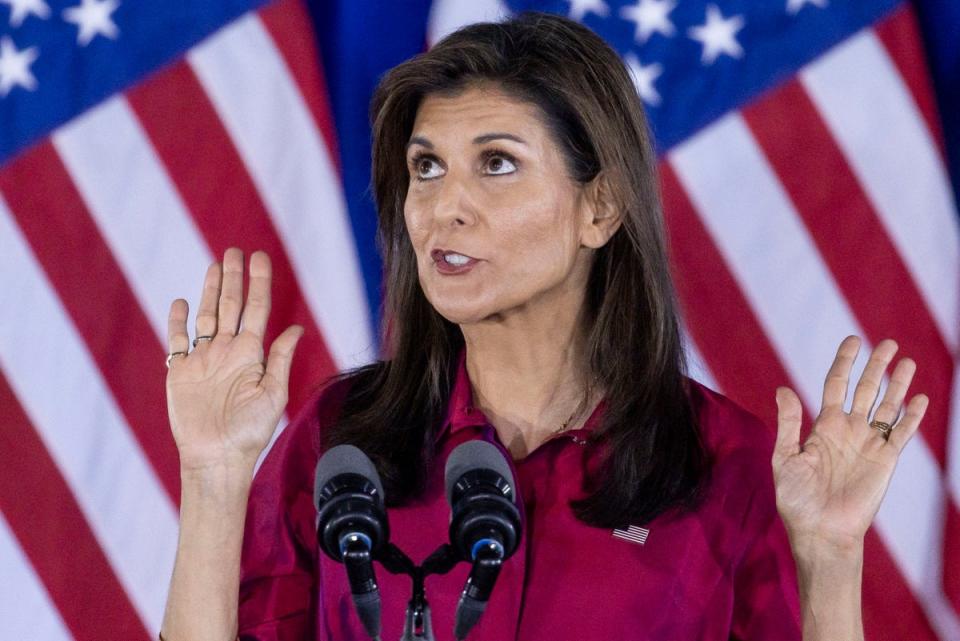Trump crushes Republican rivals for White House – then heads back to court

Three years ago, in the wake of the Capitol riot and with his second impeachment under way, Donald Trump’s political future looked over once and for all. But Republicans, led largely by Senate minority leader Mitch McConnell, voted to acquit him, all but giving him permission to continue his dominance in the Republican Party.
Now, after a devastating win over his rivals in the first contest on the road to the White House, he once again holds the Grand Old Party in the palm of his hand. But even in his moment of victory, with some polls suggesting he could defeat Joe Biden in November, he had a stark reminder of the legal dangers facing him this year as he returned to a New York courtroom for just one of the cases he is embroiled in.
The Iowa caucuses officially kicked off the 2024 presidential contest in resounding fashion when the former president overwhelmingly won the contest in the Hawkeye State.
Mr Trump’s main opponents – former South Carolina governor Nikki Haley and Florida governor Ron DeSantis – significantly trailed the twice-impeached and four-times-indicted former president after they mostly failed to criticise him throughout the preliminary campaigning and debates. Similarly, businessman and right-wing conspiracy monger Vivek Ramaswamy dropped out after a poor showing and endorsed the former president. The former Arkansas governor Asa Hutchinson, a stalwart conservative, also suspended his campaign on Tuesday.
Mr DeSantis, for his part, mostly complained about the fact that the networks declared that Mr Trump had won the caucuses while some were still underway. The Florida governor, once seen by donors and Republican consultants as the strongest challenger to Mr Trump, won second place despite many expecting him to perform worse, arguing that he had his ticket “punched out” to the New Hampshire primary despite the fact he won zero counties.
The result shows that Mr Trump’s legal troubles – from his four major indictments to a civil fraud case in New York State – have not put a dent in his image with Republican voters. Indeed, the day after his victory in Iowa, he returned to a federal courthouse in New York City to determine whether he owes writer E Jean Carroll damages for defaming her once again after he denied sexually assaulting her in a dressing room in a department store in the 1990s and accused her of lying about it.
He has already been ordered to pay her $5m (£4m) as a result of the first case. The new suit will not go over the facts again, on the grounds they have already been established, but simply determine if Mr Trump needs to pay more for repeating the defamation. Ms Carroll is asking for $10m (£7.9m). The former president seemed unperturbed by his situation, unleashing a fresh series of attacks on Ms Carroll even as he arrived at court on Tuesday morning, and repeating the false claims at the heart of the case.
If anything, Mr Trump’s legal battles have made him a hero to many of his supporters and they have lambasted the legal system for unjustly attacking him.
Ms Haley for her part went bumper-to-bumper with Mr DeSantis but still only got third place, blunting her pseudo-momentum ahead of the New Hampshire primary after she made a last-minute drive throughout the state.
The contest sets up the next Republican battle, in New Hampshire, where Mr Trump will almost certainly win again.
Trump’s grip on the GOP confirmed
Eight years ago, Mr Trump, a political neophyte and trash-talking reality television star, came second in Iowa to Senator Ted Cruz, which made people question how much influence he had on the GOP electorate.
Now, there’s no questioning Republicans’ devotion to Mr Trump. Not only did he win the Iowa caucuses; he won 98 out of 99 counties and he only lost Johnson County to Ms Haley by one vote.
Similarly, his almost 30-point margin of victory shattered Bob Dole’s previous 1996 record of winning Iowa by 13 points. Mr Trump barely campaigned in the state and eschewed the traditional retail politicking – as well as disdaining to take part in any of the Republican debates – but still managed to blow out his opponents.
DeSantis put all his chips in Iowa ... and flopped
Almost as soon as media outlets called the Iowa caucuses for Mr Trump, Mr DeSantis’s campaign and surrogates complained about “election interference” or “voter suppression”.

But the bellyaching from the Florida governor underscores an uncomfortable truth for his campaign: he bet it all on Iowa and lost. Mr DeSantis visited all 99 counties in the state, earning the endorsement of numerous state lawmakers and governor Kim Reynolds. Almost none of it mattered, though, given that Mr Trump began attacking him months before the campaign began, giving him the nickname “DeSanctimonious”.
Mr DeSantis refused to go on the offence until all signs showed he would lose. His campaign will try and spin winning silver as a strong performance, but given the amount of cash, time and energy he and his campaign expended, there is no defending his showing.
The Nikki Haley enthusaism gap
Much like Mr DeSantis, Ms Haley never posed much of a threat to Mr Trump, either in Iowa or New Hampshire. But the fact she began cutting into the non-Trump slice in the Republican electorate provided an incentive for her to make a last-minute jaunt through Iowa.

The former South Carolina governor, who Mr Trump appointed US ambassador to the UN, relied on some Democrats who crossed over to caucus for her. She’s made the case that she can win in 2024 because she has crossover appeal. But she lost in almost all of the major suburban areas, including the counties that include the Des Moines suburbs to Mr Trump. Indeed, she only picked up one county – Johnson County, where Iowa City is located – by one vote.
But in the end, her biggest problem came down to enthusiasm. The final NBC News/Des Moines Register/Mediacom Iowa poll released this weekend showed only 9 per cent of Haley supporters said they were “extremely enthusaistic” compared to 23 per cent of DeSantis supporters and 49 per cent of Trump supporters. She also had about an even split of people who had a favourable opinion (48 per cent) versus an unfavourable opinion of her (46 per cent). Ultimately, those numbers led to her getting the bronze.
Will Republicans get in line?
Prior to the Iowa caucuses, many Republican senators and governors have refrained from backing Mr Trump, though all of the House GOP leadership – including speaker Mike Johnson, majority leader Steve Scalise, majority whip Tom Emmer and conference chair Elise Stefanik – endorsed him.
The weekend before the caucuses, he received the endorsement of his former rival Sen Marco Rubio of Florida, a major snub to Mr Rubio’s home state governor Mr DeSantis.
At the same time, Mr Trump has proven to be a major drag on Republicans ever since he won the White House in 2016. Once again, they will need to balance distancing themselves from him enough to win back voters who have moved away from the GOP with appealing to his base of voters without whom they cannot win.
How do Democrats respond?
As of right now, much of the country does not believe that the 2024 contest will almost certainly be a 2020 rematch. One person who is certain this will happen? President Joe Biden.
Mr Biden has already begun campaigning in earnest against Mr Trump, laying out the dangers his predecessor poses to democracy while at the same time selling himself as the person willing to protect democracy.
But Mr Biden faces persistent questions about his age and many voters continue to feel that inflation is too high. The incumbent has to counteract this fatigue with a message laying out the stakes if he is to be even remotely competitive.


